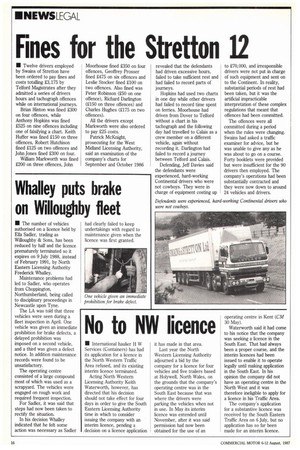Fines for the Stretton 12
Page 18

If you've noticed an error in this article please click here to report it so we can fix it.
• Twelve drivers employed by Swains of Stretton have been ordered to pay fines and costs totalling £3,175 by Telford Magistrates after they admitted a series of drivers hours and tachograph offences while on international journeys.
Brian Hinton was fined 2300 on four offences, while Anthony Hopkins was fined £525 on nine offences including one of falsifying a chart. Keith Huffer was fined 2150 on three offences, Robert Hutchison fined £125 on two offences and John Jones fined £300 on four.
William Markworth was fined £200 on three offences, John Moorhouse fined 2350 on four offences, Geoffrey Prosser fined 2475 on six offences and Leslie Stocker fined £100 on two offences. Also fined was Peter Robinson (250 on one offence), Richard Darlington (£150 on three offences) and Charles Hughes (£175 on two offences).
All the drivers except Markworth were also ordered to pay £25 costs.
Patrick McKnight, prosecuting for the West Midland Licensing Authority, said an examination of the company's charts for September and October 1986 revealed that the defendants had driven excessive hours, failed to take sufficient rest and had failed to record parts of journeys.
Hopkins had used two charts in one day while other drivers had failed to record time spent on ferries. Moorhouse had driven from Dover to Telford without a chart in his tachograph and the following day had travelled to Calais as a crew member on a different vehicle, again without recording it. Darlington had failed to record a journey between Telford and Calais.
Defending, Jeff Davies said the defendants were experienced, hard-working Continental drivers who were not cowboys. They were in charge of equipment costing up
to £70,000, and irresponsible drivers were not put in charge of such equipment and sent on to the Continent. In reality, substantial periods of rest had been taken, but it was the artificial impracticable interpretation of these complex regulations that meant that offences had been committed.
The offences were all committed during a period when the rules were changing. Swains had asked a traffic examiner for advice, but he was unable to give any as he was about to go on a course. Forty booklets were provided but were insufficient for the 90 drivers then employed. The company's operations had been substantially contracted and they were now down to around 24 vehicles and drivers.
































































































